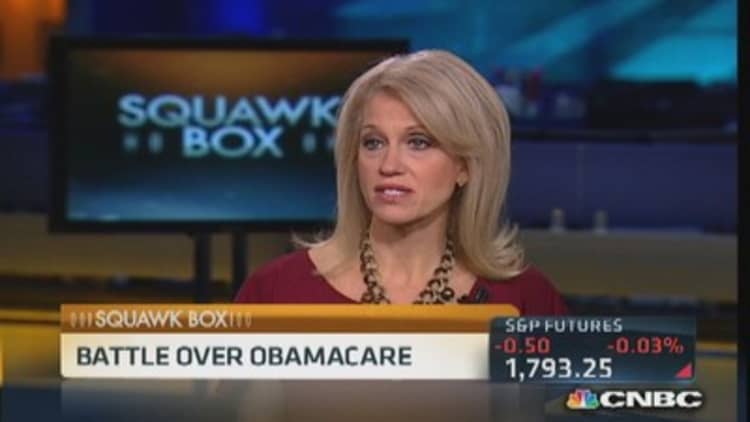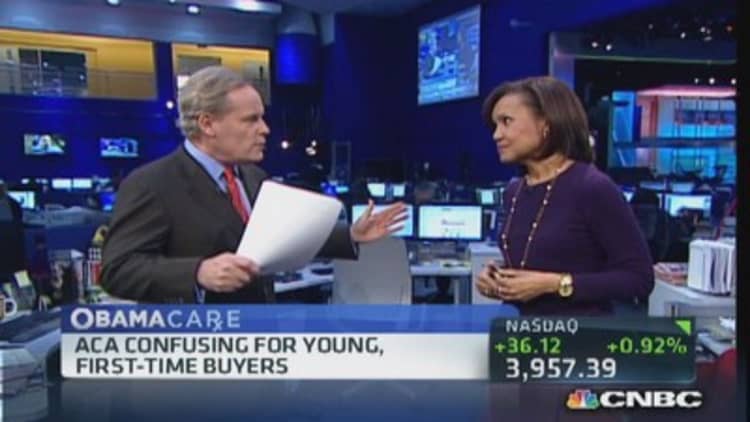Republicans are planning to use the troubled health law against Democrats in next year's midterm elections, but the Affordable Care Act is increasingly dividing their party, too.
At the annual meeting here of the nation's Republican governors, the ones who are eyeing presidential runs in 2016 say they oppose the health care law. But there is sharp disagreement among those who have helped carry out the law and those who remain entrenched in their opposition.
These early divisions reveal not only the difficult calculations of ambitious Republican politicians as they look to the next presidential campaign, but also the complexities of being a governor rather than a lawmaker at a time when the party's base is hostile to those who cooperate with Democrats.
(Read more: )
The governors who refused the Medicaid expansion money that is part of the health care law — believing they had found a wedge issue — are already boasting about it.
"I said no," Gov. Scott Walker of Wisconsin said, "because if I took the Medicaid expansion I'd be dependent on the same federal government that can't get a basic website up and going even after two and a half years to come through with payments for Medicaid in the future when they start weaning off paying for 100 percent of coverage."
Under the new law, the federal government pays the entire cost of Medicaid expansion for three years and 90 percent after that.
Mr. Walker, who is seen as a candidate who can potentially bridge the differences between the Tea Party and the Republican establishment, said conservatives would have long memories on how the law was carried out.
"I don't think it's a deal-breaker, but I think it's pretty high on the importance list for a lot of voters out there," he said.

(Related video: The political battle over Obamacare)
Gov. Rick Perry of Texas, who also turned down the Medicaid money and is thought to be considering a second presidential run, used even more vivid language. "It's like putting 1,000 more people on the Titanic when you knew what was going to happen," he said.
He also said in an interview between sessions of the Republican Governors Association meeting that it would matter in a political context.
"I think it's a factor; I think it's a philosophical position," Mr. Perry said of Medicaid expansion, noting that even President Obama had called Medicaid — which is financed by both the states and federal government — part of "a broken system."
"Whether somebody took it or didn't, I'll leave it up to them to justify to their constituents why," he said of the federal money.
More from the New York Times:
Partisan fever in Senate likely to rise
California encouraged by health plan enrollment
Yellen's appointment almost a done deal
That is not to say that Mr. Perry would not use the issue to his advantage in a presidential primary race. It is not difficult to project how it could play out in the 2016 campaign, said Republican strategists, noting that the governors who accepted the Medicaid expansion could easily be pegged in television ads and mailers as having effectively approved the president's health care law.
Mr. Walker and Mr. Perry are not the only ambitious Republicans to sound a "Where were you on Obamacare?" line of attack. Senator Rand Paul said this week that Gov. Chris Christie of New Jersey, perhaps the leading 2016 contender among establishment Republicans, would have to answer for his decision to take the Medicaid money.
"On the case of the New Jersey governor, I think embracing Obamacare, expanding Medicaid in his state is very expensive and not fiscally conservative," Mr. Paul said.
He added, "Many Republican governors I would say are conservative did resist expanding and accepting Obamacare in their states."
(Related video: Dems' light at end of Obamacare tunnel?)
Mr. Paul's criticism underlines one of the challenges governors face as they contemplate presidential campaigns. House members and senators do not face the same dilemma: While members of Congress vote on legislation, bills can be passed without their support. But governors face decisions that affect the residents of their states.
Gov. John Kasich of Ohio expressed this political fact of life, becoming animated as he was questioned at a meeting with reporters here about his decision to expand Medicaid.
"I always try to put myself in the shoes of somebody else to say: 'How would I feel if I didn't have health insurance? Are you kidding me?' " said Mr. Kasich, who has been mentioned as a 2016 hopeful, his voice rising. In defending Medicaid, he spoke at length about the scourge of drug addiction and challenges faced by those with mental illnesses.
"It's going to save lives," he said. "It's going to help people, and you tell me what's more important than that."
(Read more: California plans banned from Obamacare fix)
The issue is a particularly delicate one among Republican governors, not only because they have disagreed on whether to take the Medicaid money, but because Mr. Christie, already a leading figure in the party, formally took over the Scottsdale meeting as the association's chairman.
Gov. Nikki R. Haley of South Carolina has made much of her decision to turn down the Medicaid expansion, frequently boasting that "we didn't just say no, we said never." But she took a more restrained position here when sitting next to Mr. Christie at a news conference.
"I don't think that the people of South Carolina will make a decision on one issue," said Ms. Haley, whose state holds the South's first presidential primary.
But when asked if she was suggesting that the health law would not be a factor in 2016, Ms. Haley clarified "it is going to be an issue, certainly," but would not be "the sole issue."
(Read more: 'Tiny fraction' will lose health plans, pay more: study)
Some of the Republican governors are still determining how to handle Medicaid expansion. They include Mike Pence of Indiana, who said he would like to take a middle course on the issue, using the new federal money to cover more low-income Indiana residents but do so through a state-run program.
"I believe it could be a pilot program for the kind of health care reform that is grounded in the principles of consumer-driven health care," Mr. Pence said.
As to whether he would be vulnerable in a presidential primary because he accepted money provided through the Affordable Care Act, Mr. Pence demurred. "The circumstances of each state with regard to Medicaid are different," he said.

(Related video: Obama confusing for young buyers)
Former Gov. Haley Barbour of Mississippi made same argument in discussing why conservatives ultimately would not punish governors who took the Medicaid money. "Some people may try to make it an issue, but I think they're going to find out it's not the kind of issue they expect it to be," he said.
Mr. Kasich, asked if taking the funding could hamper his own presidential prospects, shot back, "Is that how you're going to make a decision?"
But then he offered a prediction that might have been rooted in his hopes: "I think all things kind of fade over time."
—By Jonathan Martin of The New York Times

